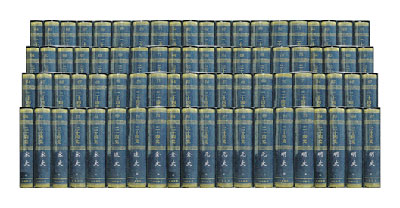|

China has kicked off a large-scale revision project of the Twenty-Four Histories, an ancient book collection recounting the country's 4000-year-plus history, in an attempt to make up for the "regrets" left in the first edition.
"The revising work of the first edition lasted as long as twenty years. Many historians and experts didn't stick to the end due to various reasons and had to be replaced by others. So the standards were not the same and the outcome left a lot to desire," said Xu Jun, vice editor-in-chief of the Zhonghua Book Company, which supervises the project, in an interview on Thursday with Xinhua.
The Twenty-Four Histories contains 24 historiographies, each of which recounts a different time period of the country's 4,000-year history. With 3,249 volumes and about 40 million words, the whole set covers literature, art, science, military, economy, ethnography and many other fields.
The collection is considered an authoritative source of traditional Chinese history.
The revising work of these books started in 1958 and lasted until 1978. It involved more than 200 scholars and experts.
According to Xu, during the country's "Cultural Revolution" (1966-1976), historians and experts were strictly forbidden to do textual research and many had to do it in secret to revise the Twenty-four Histories.
The "Cultural Revolution" refers to a period of social and political upheaval in the country's history. The extremist policy of the day led to the crackdown on many cultural study and researches.
"Many scholars had found precious materials to add to the edition, but they didn't dare," Xu said, adding that they were called to Beijing for the revision but the work came to a stop in 1966 under political pressure.
Xu said when the situation was better around 1971, these experts were called back to Beijing to restart the project. But the work didn't go smooth as some of them died of old age or quitted and had to be replaced by new project members.
In addition, scholars and experts had to rush work to finish the first four historiographies to have them published to mark the tenth anniversary of the founding of the New China in 1959. Xu said the quality of the first four ones were "not good".
According to a statement released during a work meeting on the project here Wednesday, this time's revision will focus on correcting character and punctuation mistakes, rewriting preface for every volume and improving notes and explanations for the original texts.
"Compared with last time's edition, now we have much richer historical materials to refer to and more advanced technology with the help of Internet," said Xu.
Many library museums have contributed their own historical documents to the project for information collecting and research.
According to Xu, the Fu Ssu-Nien Library under Taiwan's Academia Sinica also contributed its own version of Shiji, or the Records of the Grand Historian. It's the first historiography of the Twenty-Four Histories.
The project involves more than 200 scholars and experts from 13renowned universities and academic institutes, including Peking University, Fudan University, Nanjing University and the Chinese Academy of Social Sciences.
Xu Jun noted that it was a rare opportunity to gather so many experienced scholars and experts for the country's literary history study.
"Literary history has become a less popular subject nowadays. As time goes, more aged scholars and experts will pass away. It will be really hard for newcomers to follow," he said.
"It's not simply an update. This time's revision is about the cultural inheritance and accumulation of the Chinese nationality," said Liu Binjie, director of the General Administration of Press and Publication.
Liu said the newly-revised edition would be a "symbolic publication" and set an example for revising ancient books in the future.
The revised edition is scheduled to be published in 2012.
(Xinhua News Agency June 12, 2009) | 